The Akita is a large and powerful breed of dog known for its intelligence and loyalty. Originating from Japan, the Akita has a distinctive appearance: a thick double coat, triangular ears, and a muscular build. In this article, we will delve deeper into the topic of Akita weight, exploring the factors that influence its size, the ideal weight range for this breed, and how to maintain a healthy weight for your Akita.
The average weight of an Akita breed dog is 70-130 pounds (32-59 kg). The importance of an Akita dog can vary depending on its gender, age, and overall health. Male Akitas are generally larger and heavier than females.
A healthy weight for an adult Akita should allow for a clear waistline and visible ribs without excess fat. Maintaining a balanced diet and regular exercise for a healthy weight in dogs is essential.
It’s also important to note that the Akita breed tends to gain weight quickly, so regular exercise and portion control are vital in keeping them at a healthy weight. Overweight dogs are at higher risk for health issues such as joint problems, diabetes, and heart disease.
Akita weight
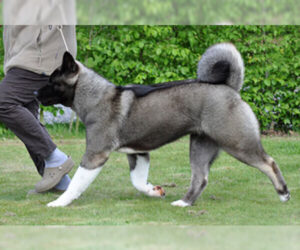
The weight of an Akita can vary greatly depending on the gender, with males typically weighing between 70-130 pounds (32-59 kg) and females weighing between 50-100 pounds (23-45 kg). It is important to note that weight can also be influenced by factors such as nutrition and overall health. Akitas are generally considered large dogs with robust and muscular builds.
Factors that can influence Akita’s Weight:
Nutrition: Overfeeding and a diet high in unhealthy fats can cause weight gain and lead to obesity. To prevent this, it is essential to measure meals and feed a balanced diet with appropriate portion sizes.
- Lack of exercise: Inactivity can lead to weight gain in dogs. To prevent this, Akitas should get a regular daily routine, such as walks, runs, or playtime.
- Genetics: Some dogs are predisposed to obesity due to their genetics. This factor is difficult to control, but maintaining a healthy diet and exercise regimen can help prevent excessive weight gain.
- Medical conditions: Certain conditions, such as hypothyroidism, can cause weight gain. If your Akita is gaining weight rapidly or is overweight, it is vital to take them to the vet for a check-up.
- Age: As dog‘s age, their metabolism can slow down, making it easier for them to gain weight. To prevent this, it is important to adjust their diet and exercise regimen as they get older.
- Neutering/spaying: Neutered or spayed dogs can also be at a higher risk for obesity due to decreased metabolism. It is crucial to monitor their weight and adjust their diet and exercise as needed.
To prevent obesity in Akitas, it is vital to maintain a balanced diet, exercise regularly, and monitor their weight.
What is the average weight of an Akita?
The average weight of an Akita is between 70-130 pounds (32-59 kg). An Akita Inu puppy typically weighs between 4-12 pounds (2-5 kg) at birth and will gain an average of 2-3 pounds (1-1.5 kg) per week during its first year.
An adult Akita can weigh anywhere between 70-130 pounds (32-59 kg), with females typically weighing between 70-100 pounds (32-45 kg) and males weighing between 100-130 pounds (45-59 kg). The weight of an Akita can vary depending on factors such as diet, exercise, and overall health.
What should be the ideal weight for an Akita?
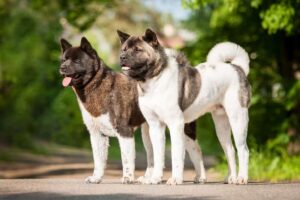
An ideal weight for an Akita is typically between 70-130 lbs, depending on height and build. The ideal weight can vary and depends on factors such as the dog’s height, sex, and overall build. It’s best to consult a veterinarian for personalized assessment and guidance.
It’s also important to note that a healthy weight range for a dog can change over time as they grow and age, so regular check-ups and monitoring of their weight are recommended. A balanced diet and regular exercise can also help maintain a healthy weight for your Akita.
Is an Akita a heavy or light breed?
The Akita is a large, heavy, and powerful breed of dog from Japan. They are well-muscled, sturdy, and have a heavy bone structure. Males typically weigh between 70-130 pounds, with females weighing slightly less. The Akita’s large size and weight make them well-suited for working and guarding duties, but they also require proper care and exercise to maintain their health.
It’s essential to keep an Akita healthy, as being overweight can strain their joints and increase the risk of specific health problems such as heart disease and diabetes. A balanced diet and regular exercise can help Akita maintain a healthy weight and overall physical fitness.
Overall, the Akita’s heavy build is a defining characteristic of the breed and plays a role in their work and companion capabilities. However, it’s important to remember that their weight and size also require proper care and attention to maintain their health and well-being.
How does Akita’s weight compare to other large breeds?
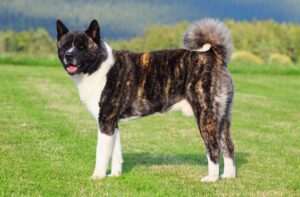
The Akita is one of the larger breeds among the large breed dogs. They typically weigh between 70-130 lbs, which is higher than other large breeds such as Labrador Retriever (55-80 lbs) and Golden Retriever (55-75 lbs).
However, they are smaller than other giant breeds like the Great Dane (110-200 lbs) and St. Bernard (140-260 lbs). So, the Akita is a heavy breed but not the heaviest among large breeds.
Can Akita’s weight vary greatly within the breed?
Weight can vary greatly within the Akita breed. This can be due to several factors, such as genetics, diet, exercise, and overall health. Some Akitas may be on the lighter side and weigh closer to 70 lbs, while others may be on the heavier side and weigh closer to 130 lbs. Additionally, males are generally larger and heavier than females.
It’s important to remember that a healthy weight range for an individual Akita may change over time as they grow and age, so regular check-ups and monitoring of their weight are recommended. Consulting a veterinarian can provide a personalized assessment and guidance on maintaining a healthy weight for your Akita.
Does an Akita’s weight affect their health?
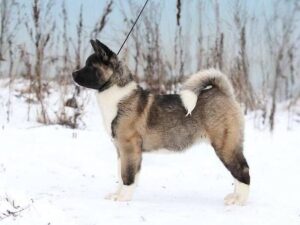
An Akita’s weight can affect their health. Like all dogs, Akitas must maintain a healthy weight for their well-being. Being overweight can put extra strain on their joints, increase the risk of certain health problems such as heart disease and diabetes, and negatively impact their quality of life. On the other hand, being underweight can also be detrimental to their health and may indicate an underlying issue such as a health problem or an inadequate diet.
It’s important to monitor an Akita’s weight regularly and make adjustments as needed to maintain their health. A balanced diet and regular exercise can help keep them at a healthy weight, while regular check-ups with a veterinarian can provide personalized guidance and monitoring of their health.
How to determine if an Akita is at a healthy weight?
To determine if an Akita is at a healthy weight, you can follow these steps:
- Consult a veterinarian: A veterinarian can perform a physical exam and provide a personalized assessment of your Akita’s weight and overall health.
- Check their ribcage: You should be able to feel your Akita’s ribcage without seeing it. If you can see their ribcage, they may be underweight. If you can’t feel their ribcage, they may be overweight.
- Look at their waist: An Akita should have a visible waist. If the waist is not visible or is wider than the ribcage, they may be overweight.
- Monitor their food and exercise: Keeping track of your Akita’s food intake and exercise levels can help determine if changes need to be made to their diet and exercise routine to maintain a healthy weight.
- Repeat regularly: Regularly checking and monitoring your Akita’s weight is essential, as their weight can change over time due to growth, age, and health changes.
It’s important to remember that every dog is unique and may have different ideal weight ranges based on height, build, and overall health. Consulting a veterinarian for a personalized assessment is the best way to determine if your Akita is at a healthy weight.
How to achieve and maintain a healthy weight for an Akita?
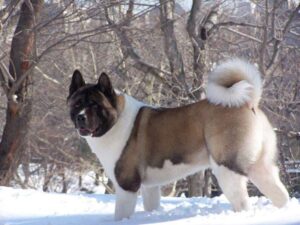
To achieve and maintain a healthy weight for an Akita, you can follow these steps:
- Consult a veterinarian: A veterinarian can provide a personalized assessment of your Akita’s weight and overall health and recommend a balanced diet and exercise plan.
- Balance their diet: A balanced diet that provides sufficient nutrients and calories to meet their needs is crucial for maintaining a healthy weight. A veterinarian can provide specific recommendations based on your Akita’s age, size, and activity level.
- Control portion sizes: Overfeeding your Akita can contribute to weight gain, so it’s crucial to control portions and avoid giving them too many treats.
- Regular exercise can help your Akita maintain a healthy weight and overall physical fitness. This can include walks, runs, or playtime with toys.
- Monitor their weight: Regularly monitoring your Akita’s weight and adjusting their diet and exercise plan can help ensure they maintain a healthy weight.
- Regular check-ups: Regular check-ups with a veterinarian can provide personalized guidance and monitoring of your Akita’s health and weight.
Always remember that every dog is unique, and their needs for diet and exercise can change over time due to growth, age, and health changes.
An Akita’s weight is not directly related to their hunting ability. Hunting ability is influenced by a combination of instincts, training, and physical skills.
The weight of an Akita, like all dogs, is influenced by several factors, such as genetics, diet, and overall health. The Akita breed is known for its sturdy, muscular build, and the average weight of an adult Akita is between 70-130 pounds. However, the weight alone does not dictate an Akita’s hunting ability.
A combination of instincts, training, and physical abilities, such as agility, speed, and endurance, determines hunting ability. Instincts, such as a strong prey drive, can be influenced by genetics and play a significant role in an Akita’s ability to hunt.
Training is also essential, as it can train an Akita to hunt various games, from small animals to large tournaments, depending on their instincts and physical abilities. Physical abilities, such as agility, speed, and endurance, are also essential for hunting and can be improved through exercise and training.
How does neutering or spaying affect an Akita’s weight?
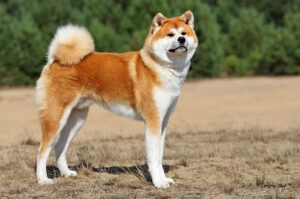
Neutering or spaying an Akita can affect their weight, although the extent of this effect can vary depending on the individual dog.
Spaying or neutering can cause a decrease in a dog‘s metabolism, leading to weight gain if their food intake remains unchanged. This is because neutered or spayed dogs have a lower energy requirement due to the reduction of hormones responsible for regulating metabolism.
Additionally, some dogs may become less active after being neutered or spayed, which can also contribute to weight gain. It’s important to monitor an Akita’s food intake and exercise level after neutering or spaying and make adjustments as needed to maintain a healthy weight.
Weight gain is just one of the potential side effects of neutering or spaying. The overall health benefits of these procedures, such as reducing the risk of certain cancers and behavioral issues, often outweigh any potential weight-related problems.
Are there any genetic factors that contribute to an Akita’s weight?
There are genetic factors that can contribute to an Akita’s weight. Like all dog breeds, the Akita has a unique set of genetic traits that can influence its physical characteristics, including weight.
Genetic factors that can affect an Akita’s weight include the size and structure of its bones, muscle mass, and metabolism. Some Akitas may have a genetic predisposition to being larger or smaller, which can impact their overall weight.
Additionally, certain health conditions with a genetic component, such as hypothyroidism, can also affect Akita’s weight.
Genetics is just one factor contributing to an Akita’s weight, and that other factors such as diet and exercise also play a significant role. Pet owners can help ensure that their Akita maintains a healthy weight regardless of its genetic predisposition by providing a balanced diet and regular exercise.
What is the maximum weight an Akita can reach?
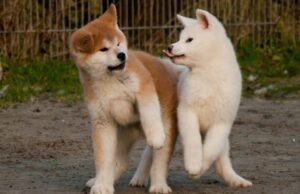
The maximum weight that an Akita can reach depends on various factors such as genetics, diet, and overall health. On average, adult Akitas weigh between 70-130 pounds, with males typically larger than females.
However, some Akitas may weigh significantly more or less than this average, depending on their genetics and overall health. It’s important to monitor an Akita’s weight and adjust their diet and exercise accordingly to maintain a healthy weight and prevent obesity, which can lead to other health problems.
Ultimately, there is no set maximum weight for Akitas, as the breed’s size can vary significantly among individuals. As long as an Akita is healthy and maintains a balanced diet and exercise routine, its weight should not be a cause for concern.
Can an Akita’s weight change over time as they age?
An Akita’s weight can change over time as they age. Like all dogs, Akitas can experience weight changes due to various factors, such as changes in their metabolism, diet, and activity level.
As Akita ages, their metabolism may slow down, which can lead to weight gain if their food intake remains unchanged. Additionally, older dogs may become less active, which can also contribute to weight gain. It’s important to monitor an Akita’s weight and adjust their diet and exercise routine to maintain a healthy weight.
On the other hand, some Akitas may experience weight loss as they age due to health conditions such as dental problems, gastrointestinal issues, or decreased appetite. In these cases, it’s essential to consult a veterinarian to determine the underlying cause and take appropriate action to address any health concerns.
Conclusion
In conclusion, the Akita weight can be influenced by a combination of factors, including genetics, diet, exercise, and overall health. On average, adult Akitas weigh between 70-130 pounds, but some may consider significantly more or less depending on their factors.
It’s important to monitor an Akita’s weight and adjust their diet and exercise routine to maintain a healthy weight. Additionally, neutering or spaying, as well as aging, can also affect an Akita’s weight and should be taken into consideration when monitoring their weight. Pet owners can help ensure that their Akita maintains a healthy weight and enjoys a happy, healthy life by providing a balanced diet and regular exercise.


